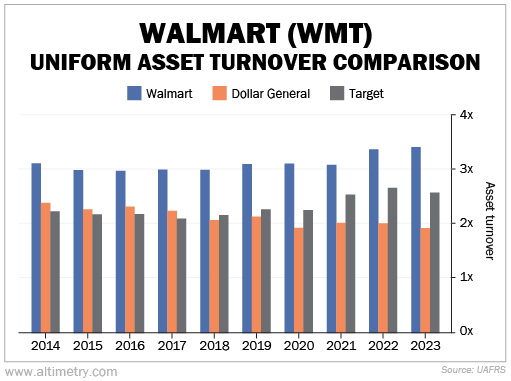 Sam Walton was so successful at his first variety store, his landlord kicked him out...
Sam Walton was so successful at his first variety store, his landlord kicked him out...
On a whim, Walton decided in 1945 to open a franchise of the old five-and-dime variety store Ben Franklin for $25,000. After attending a two-week training program, under the chain's corporate parent Butler Brothers, Walton was ready for launch.
Almost immediately, Walton began to deviate from the original strategy imposed by Butler Brothers. For example, he stopped working with all of Butler Brothers' "preferred" suppliers because he found cheaper suppliers. That let him charge less. And Walton then passed on the discounts from cheaper suppliers to the customers. Profit would be derived from volume, not margins.
His new strategy would lay the foundation of what we now know as Walmart (WMT). This simple idea sparked huge growth.
Walton's revenue grew a staggering 28% per year. By its fifth year in business, the store was selling a quarter of a million dollars a year in merchandise.
His success did not go unnoticed... especially by his landlord, P.K. Holmes.
Sam Walton was so good at running the Ben Franklin store that his landlord got jealous and greedy. He decided not to renew the property lease.
P.K. Holmes took back over the property and gave the franchise to his son in 1949. Thirty years later, the store didn't even exist anymore.
Meanwhile, Walton went on to reopen his variety store in nearby Bentonville. In the process, he created one of the largest retailers on planet Earth.
Today, we'll look at how Walton was able to build a business with such tremendous growth potential and staying power. And even though it has changed in some ways against his wishes, some of his guidance remains true today.
 Everyday workers know more than corporate...
Everyday workers know more than corporate...
Walton built Walmart upon several tenets.
Despite the company's reputation as a tough employer today, Walton was one of the most employee-oriented executives ever. He believed in treating every employee like a partner in the business.
Walton believed in the idea of complete transparency within a company. He wanted everyone on the floor to know what was going on at the top level and vice versa.
It's the most effective way to know how to improve the business. In theory, the workers have a great understanding of day-to-day functions.
The associates on the floor would have a much better idea of how to improve efficiency than someone sitting in a corporate headquarters. Listening to what workers in the trenches had to say helped Walton succeed at his most important tenet...
Control expenses better than your competition.
 Competitors are afraid of Walmart's pricing...
Competitors are afraid of Walmart's pricing...
Since Walton died, Walmart seems to have abandoned its dedication to its employees. But it has continued to improve its efficiency.
Walmart can charge less for its products compared with its counterparts because it has some of the best cost controls on the planet.
Its merchandise rose, on average, 3% in price in the 14 months through February 2023. At the same time, there was a 7.5% increase for the same products sold on Amazon (AMZN) and a 9% increase at Kroger (KR) and Target (TGT).
Keeping prices steady and cheaper helps Walmart sell tons of merchandise. Few retailers can match its ability to generate sales...
"Asset turnover" compares annual sales against the assets on a company's balance sheet. It's a great way to see how well a company utilizes its resources to make money.
Walmart's Uniform asset turnover is consistently above 3 times. That means for every dollar in assets the company has, it's generating $3 in sales.
Neither Dollar General (DG) nor Target come close.
Walmart is levels above others.
Though things appear to have changed...
Today, Walton's tenets seem to be at odds with each other.
We're worried that Walmart has chosen to focus simply on cost efficiency and is disenfranchising its workforce. It has faced lawsuits from workers who alleged the company forced them to work off the clock, denied overtime pay, or failed to give them rest and lunch breaks. Walmart also has one of the largest employee populations on food stamps.
Sam Walton understood you couldn't have cost efficiencies without partnering with your workforce. So we'll be watching carefully to see if Walmart's current labor practices coincide with a steady rise in its costs and prices.
Regards,
Joel Litman
July 28, 2023



 Sam Walton was so successful at his first variety store, his landlord kicked him out...
Sam Walton was so successful at his first variety store, his landlord kicked him out...


